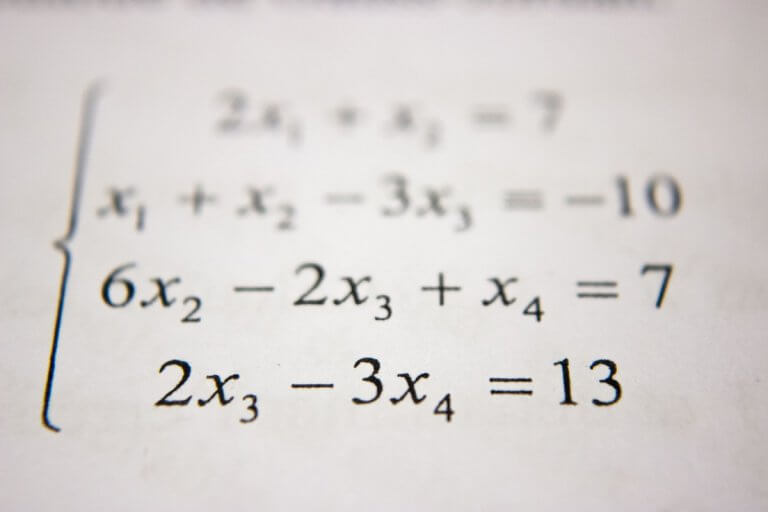
Mathematics is probably the one subject that students love complaining about.
According to the most recent National Assessment of Educational Progress report, almost 40% of 8th-grade students perform below average in math – which means they likely cannot use similarity to find the length of a side of a triangle.
Disliking the subject from a young age makes learning mathematics a chore as you get older, which results in never really learning how to study mathematics properly.
Perhaps dealing with just the numbers is fine. But when the alphabet starts getting involved, that’s where things get a little more complicated.
Unfortunately, most students can’t escape maths when they enter university. Despite saying that, yes, you don’t use ax2 + bx + c = 0 in your day-to-day life, a majority of higher education programmes have a mathematics requirement or similar.
Business students are forced to dabble in numbers in economics or statistics classes, or even take up calculus. Even if you decide to major in humanities or liberal arts, chances are that even applying to the programme will require you to have a passing grade in mathematics.
So why is it so hard in the first place?
Why many students struggle with mathematics
If you’ve hated mathematics since you were young, chances are that you will continue to hate it even through college.
A weak foundation
The most basic reason. For many students who struggle with mathematics, it’s simply because they never had the proper foundation needed to succeed in it.
Without proper guidance or practice, these students may have fallen behind as compared to their classmates, or educators may have already moved on to advanced material before these students were even ready.
As a result, these students are left fumbling and trying to find their footing in a difficult subject, never really being able to understand or master the basics, let alone completely.
It’s difficult to relate to
For students, especially young ones, learning happens best when it can be related to real life.
As mathematics becomes more advanced and challenging, it can be difficult to do. Sure, we could buy two apples and oranges from the supermarket, but calculating their density and circumference is another challenge altogether.
As a result, students are forced to work harder and practice longer to understand more abstract mathematics concepts.

Just like chess, which is played on a black and white board, one tiny mathematical error can be a costly mistake. Source: AFP
Black and white
Unlike other subjects, there is no room for error when it comes to mathematics. Answers are always precise, and even a wrongly placed decimal will result in a wrong answer.
More often than not, this right-or-wrong nature of mathematics can quickly become a frustrating and stressful experience for students.
Memorising doesn’t work
Students face difficulties in solving mathematics problems because they fail to understand concepts to the core.
While certain formulas do need to be memorised in order to apply them, it’s still impossible to memorise every theorem, equation, or trigonometric sum.
Rather, how to study mathematics correctly involves knowing and understanding the concepts in-depth, then applying them to the equations at hand.
Frankly, even this author loathes the subject. But admittedly, mathematics isn’t impossible as long as you’re willing to put in the work.
Let’s take a look at how to study mathematics effectively without hating it.
View this post on Instagram
How to study mathematics – the right way
Practice, practice, and more practice!
We hate to nag, but practice does make perfect.
This isn’t much of a secret, but many students overlook this essential advice when it comes to maths. Mathematics requires plenty of “doing”, and it’s not a subject you can memorise from a textbook the night before an exam.
You’ll need to understand the logic and processes behind the problems, which comes naturally with practice. It also allows you to identify and work through common errors and mistakes, helping you become better at the subject.
As this Reddit commentor says: “Having no idea what you’re doing is a good start. My favourite method for studying mathematics is doing problem after problem after problem. I will often get a problem wrong 3-4 times before I get it right.”
You’ll need plenty of practice to solve problems, and the more practice you do the better – especially if you never fully understood the basics. If you’re weak at math, get stronger by getting yourself some practice books or downloading practice exercises online.

Nothing beats good ol pen and paper when it comes to studying. Source: AFP
Do it the old-fashioned way
The best way to learn something new and practice it is by writing it down physically on pen and paper. Trust us.
The interactive exercises and YouTube videos are a great way to get cracking on a new concept or chapter, but it’s more effective if you rephrase what the books and videos are saying in your own words and understanding.
Then when it comes to the actual practice, do it on pen and paper as well.
This Redditor suggests that one should “spend that time studying mathematics instead of wandering around YouTube for advice on how to study it, as YouTube is a sinkhole of nonproductivity.”

Even when you’re taking classes online, don’t get distracted. Source: AFP
Take proper notes
When you’re in a class, take detailed notes on what your professor is saying. Instead of merely copying the examples or formulas on the board, jot down the explanations and tips stated by your professor on how to study mathematics.
Plus, mathematics encourages active learning, so you’ll be actively engaged with the topic, and can better absorb the material instead of zoning out and trying to catch up later.
Later, when you review your notes or do your homework, these notes might just be what you need to solve a complex problem, as you’ll be able to recall what your professor said about tackling it.
Also, when it comes to assignments and homework, it’s best not to wait too long so the concepts are still fresh in your mind. If you complete them dutifully after each class, you will likely find it easier to master the concepts and identify your problem areas.

There’s nothing to be ashamed about when asking for help. Source: AFP
Ask for help
A simple concept, but many struggle with it as they may feel embarrassed or fear they sound dumb.
But never be afraid to ask for help. Mathematics is a cumulative subject, meaning you’ll need a strong foundation, or you’ll easily and quickly get left behind.
It’s okay if you can’t seem to muster up the courage to ask a question in class, but you can always approach your teacher or professor after the lesson, during tutorials, or during office hours.
Some lectures also have teaching assistants you can ask for help if your professor is too busy. As soon as you run into a problem you can’t fix, ask them for help so you can figure it out early before the end of the school year comes, and you’re in over your head.
You can also get help from your peers, seek tutoring if you’re really struggling, or join a study group where you can discuss problems together. Sometimes, you just need something explained to you in a different way to truly understand it. Getting some support and help could be just what you need to master mathematics!
View on Threads
Bonus: Have more confidence
This might not be a study skill per se, but having the right attitude is very important.
When we tell ourselves from a young age that we’re not good at mathematics and lament how much we hate it, we set ourselves up to fail. Take it from this author, who is a living example.
By reinforcing this belief that you’re not good at mathematics, or that it’s too boring, you’re more likely to face maths anxiety, stress and low confidence, which lead to negative feelings such as being miserable in class, being fearful of punishment or expulsion, and closing yourself off to other sources of help.
So tell yourself from the first day of class that this is something you CAN do, believe in yourself, adopt a positive attitude, and you may find that you’re not as bad at mathematics as you first thought!
Disclaimer: This article was last updated on February 27, 2025.










